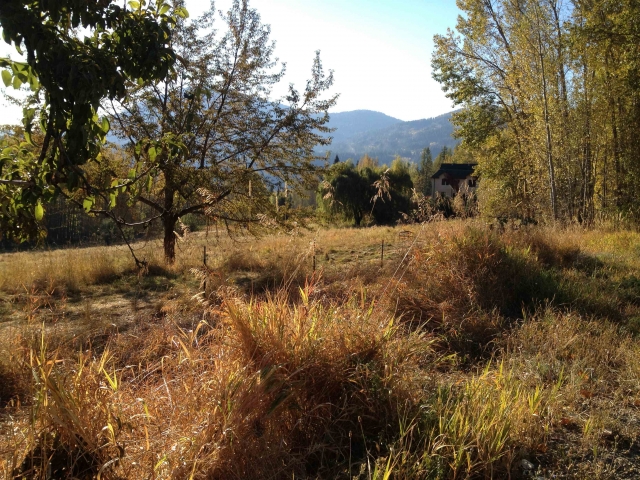Vote against OCP amendment process halts landowner's plans to subdivide in Happy Valley
[CORRECTION: This article has been modified since publication. We originally wrote that council had voted 3-3 in favour of the motion, but in fact council voted 4-2, with Mayor Granstrom in favour. Had the motion been tied 3-3, the motion would have failed. Our apologies for the error.]
Council voted 4-2 in favour of city staff’s recommendation to deny Dr. Brenda Trenholme’s application to amend the OCP (Official Community Plan) and zoning bylaw to permit her to subdivide her property at 2302 Happy Valley Road.
Trenholme spoke at the public input period to reiterate her case. She said, “It is important to preserve agricultural land,” but her land is too “steep, rocky, and boggy” to be used viably for agriculture. She added, “The few people who can afford large plots of land aren’t farmers—none of us are farmers. To preserve land for us to farm it, it’s a disconnect for me.”
Before this application could come to council, Trenholme was required to hold a public consultation and to invite neighbours from within 100 metres of her property. At the public consultation, she laid out her plans in more detail to subdivide her seven acres into two parcels, a 2.2 acre parcel with her current house, swimming pool, detached suite, and barn, and a second 5 acre parcel on which she planned to build a “small house.”
Trenholme argued that the current 5 acre limit is “arbitrary” and parcel sizes are “inconsistent” across the Happy Valley area. Several Happy Valley properties have been grandfathered at smaller sizes, and nearby lots “across the road” are in the one acre range. She also suggested that smaller lots were more likely to attract young families interested in agriculture.
She said taxes on her property were high, that restrictive abattoir laws had ruined the small cattle farms that used to provide her with farm class taxes, and she wasn’t sure whether she’d be able to sell the property. Her property is currently listed with Century21 for $1.325 million.
City staff noted that if council had chosen to pursue an OCP amendment process, several changes to the OCP would have been required to advance Trenholme’s plans, including adjustments to the growth boundary.
Staff also noted that the “majority of correspondence” received by the city was opposed to her plan. Of eight letters sent to the city, two supported the plan, one of which was sent by Happy Valley neighbours who would also like to subdivide. Of approximately 15 people who attended Trenholme’s public consultation, the five slips returned to the city by participants included two in favour and three opposed to the plan.
(These correspondences have been attached at the end of the article along with the staff report.)
Coun. Kathy Moore opened the discussion on Monday evening, noting her understanding and sympathy for Trenholme’s position, but she weighed more heavily on the community values implicit in the OCP and zoning bylaw for which there has been “so much consultation.” She said the zoning in Happy Valley has been “consistent for years,” and the point was to preserve the agricultural belt, the green belt, and a growth boundary, and pointed to similar conclusions in the recent Climate Adaptation Report.
“We really have to follow [the OCP] unless there’s a compelling reason not to,” Moore said. “I don’t see the compelling reason.”
Coun. Kathy Wallace was less concerned that the application would impact agriculture than she was about the potential impact to the city’s sewage system and costs. “Besides the fact that the OCP very much says we should retain Happy Valley as an agricultural area,” she said, “we have to be very cautious of when that need to extend sewer to Happy Valley would be required.”
Currently, Happy Valley residents must have septic systems installed. Former mayor Bill Profili and his wife Angie, neighbours to Trenholme, wrote to the city to oppose her plan on a number of grounds, including sewage: “If the fecal coloform increases in the surface water,” they wrote, “the city taxpayers are going to be forced to pay for that sewer expansion as the city will have caused the problem by allowing unserviced subdivision.”
Wallace pointed out that “hardship” for the applicant can be a deciding factor, but she did not think hardship was at play here. “The way I see it,” she said, “the applicant does have options—not the options she would like to have, but she has options.”
Coun. Cary Fisher, however, supported Trenholme’s application and voted against the staff recommendation. He denied that sewage was an issue. “All developers are required to install sewers as required,” he said. “You could easily approve an application and say, ‘You’re required to put in a sewer line.”
Mike Maturo, manager of planning, responded to a question from the mayor that such a sewer line would have to be routed under the highway below the cemetery, (the nearest highway pipe crossing is uphill of where it would be needed,) and then intercept the main line.
“As far as agriculture is concerned,” Fisher continued, “in terms of the reality of it, I don’t see that parcel of land would ever feed Rossland in any kind of significant way.”
Fisher said he didn’t see Rossland as a “rural town with 5 acre parcels,” but as a “small city”—presumably with no need to provide for local agriculture at the edges. “We have a lot of green space already,” he said.
“I don’t buy the OCP,” he said. “The OCP is flawed in this area.” He claimed, “The OCP set this aside for a couple of other reasons,” such as “cost and sewer,” but he dismissed the notion that agriculture will be practiced in Happy Valley. He further claimed that the Agricultural Land Commission “put out a report that none of the land around Rossland is suitable for [large scale] food production.”
Later Moore reminded Fisher that the Chinese gardens on top of which Fisher’s golf course sits used to provide much of the town’s food needs in an era when the population was much higher.
Coun. Jody Blomme voted with Fisher and the mayor to allow the OCP amendment process to proceed. She began, “I support the reasons to not let the application go forward, I agree with those arguments. But I also see why not being able to [subdivide] would violate a sense of fairness.” She cited the acreages across the road and non-conforming acreages in Happy Valley.
She argued it would only be “the stamp of that house” that would be built on. (The “stamp” would also potentially include a driveway, garage, septic system, decks, patios, and outbuildings.) Blomme also argued that “we are looking at these [applications] one at a time,” and it would “only be as an exception.”
The mayor concurred with this sentiment and said, “First we must understand that the OCP is a living document that moves. It was a group of citizens who made that decision, and they might make a different decision today. It’s up to us to make those decisions.”
“If we move to 1st and 2nd reading [of an OCP amendment],” Granstrom continued, “we’ll still have a chance to reconsider. Perhaps this [plan] has merit. I don’t think we’d be saying, ‘We’re getting rid of farmland.’ We deal with every application on its face value, and this might have merit.”
Coun. Jill Spearn sympathized strongly with Trenholme on a personal level, but was concerned by the “piecemeal kind of approach” suggested by Blomme and the mayor, and by “chopping up an OCP we created”—as much as she agreed that “the OCP needs to be revisited.” She said documents such as the Strategic Sustainability Plan and the OCP encapsulate the community’s “guiding vision.”
“The individual decision impacts the greater area,” she said. “The land that’s across the street, [the smaller acreages Trenholme argued were inconsistent,] there’s always going to be an ‘across the street.’ That’s the way it goes. Density [at the core], to less density, and even lesser density as you go further out, that’s just common sense in planning.”
“If we’re going to entertain this application,” she said, “then I want the OCP brought back in a bigger way, then I want to talk about growth areas, buffer areas, boundaries. Are we going to make all of those lesser acreages? If we want to be consistent, then let’s do it in a bigger way.”
Moore, Wallace, Spearn, and Granstrom voted for the motion to deny the application, and Blomme, and Fisher voted against, with Coun. Tim Thatcher absent, so the motion passed and the application was denied.

























